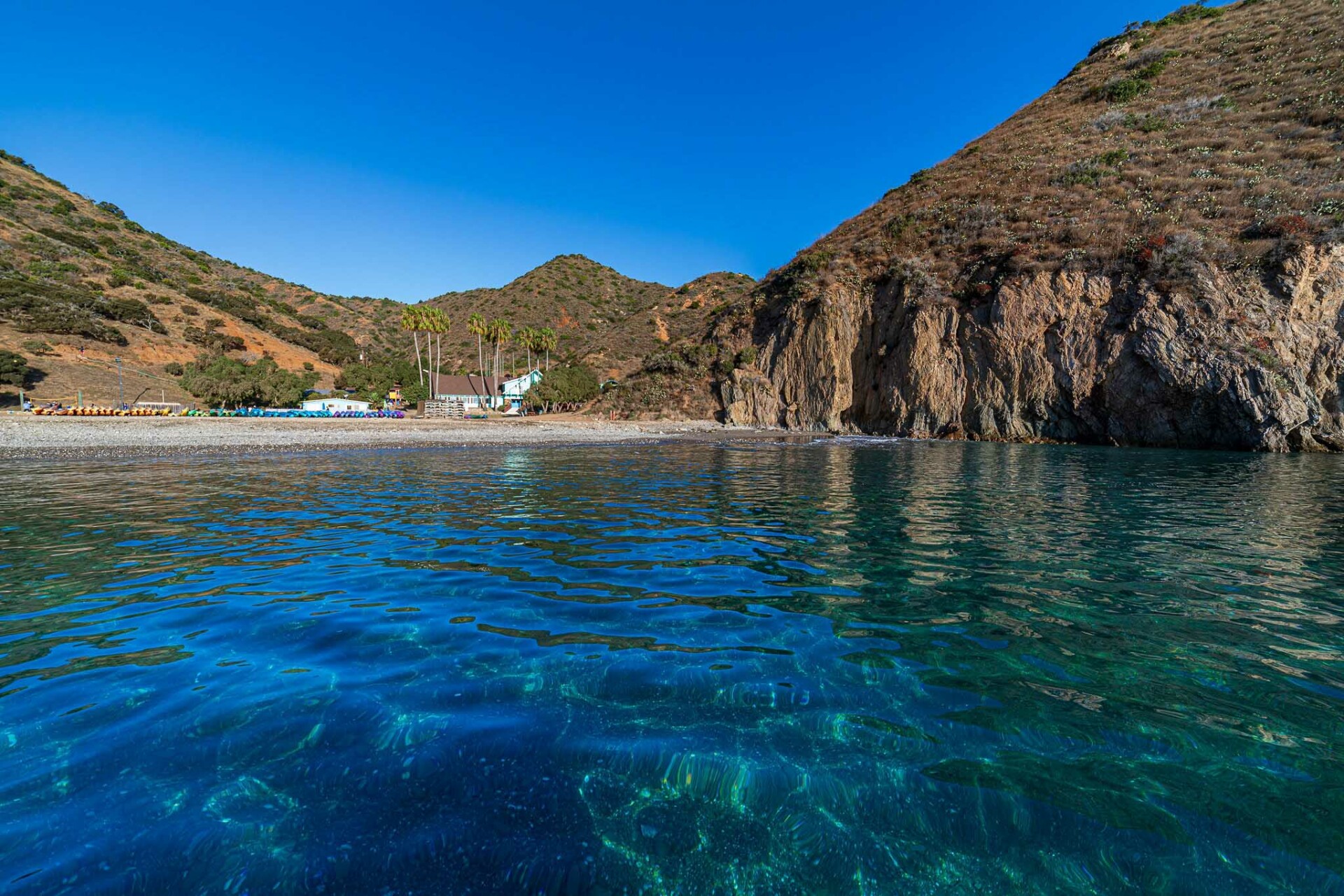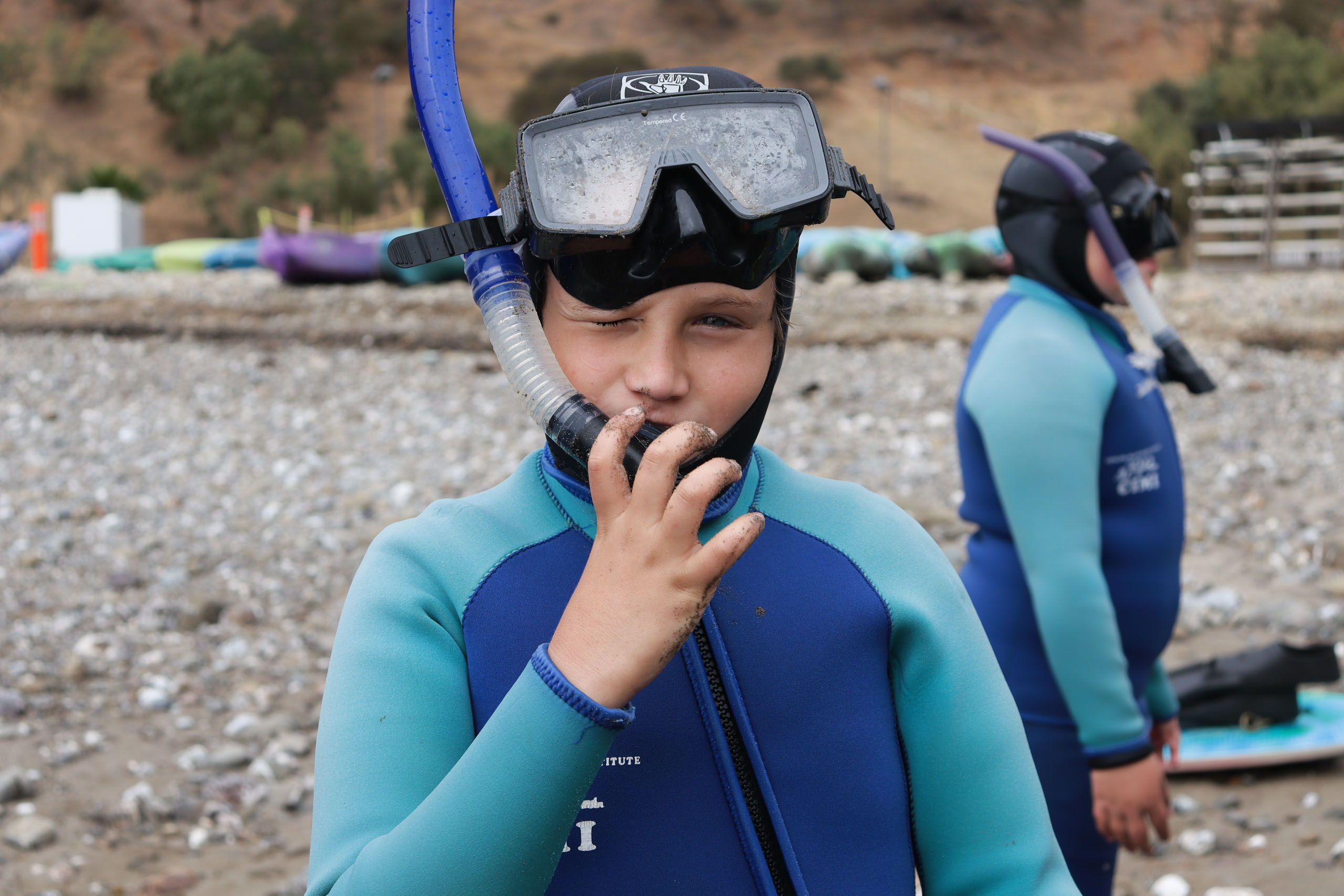Below are some frequently asked questions about our program and facility. If you do not find the information you are looking for, please contact your school’s lead teacher. If you are the lead teacher, please contact the appropriate CIMI Program Office.
About CIMI
How long is the ferry ride?
The boat takes approximately 2 hours to arrive on the island. The total travel time can vary with weather conditions, number of passengers, and the ferry’s final destinations.
Am I going to get seasick?
The crossing to the island is typically calm. However, some students do experience seasickness. If you are prone to motion sickness, you may want to have seasickness medication approved on your medical form and bring some along with you. You can help avoid motion sickness by getting out into the fresh air, looking at the horizon, and by drinking ginger ale.
What is the typical island weather like?
Daytime temperatures average 60-70°F and nighttime averages 45-60°F. Our “rainy” season begins in December and runs through March. Our average rainfall is 13 inches.
What do you do if it rains?
It rains infrequently on the island. During those rainy days, we generally continue with the program as planned. We are able to snorkel in the rain (hey, you’re getting wet anyway, right?!) unless visibility is impeded. If the rain does not permit the scheduled program, we always have fun and exciting alternatives planned.
What is the ocean temperature?
The winter ocean temperature ranges from 56-62°F. The water warms throughout the year to a maximum of 72°F in September. All guests are outfitted in wetsuits to keep them warm in the ocean and provide flotation.
Will I encounter wildlife?
Catalina Island is home to several interesting native and non-native species. It is possible to encounter deer, foxes, snakes, or even a bison while at camp! While these are all wild animals and we cannot control their presence, instructors and administrators thoroughly educate guests about local wildlife and how to appropriately behave around or respond to these animals. Additionally, guests will encounter marine wildlife while snorkeling such as fish, crabs, and, if you’re lucky, leopard sharks!
How are CIMI instructors hired and trained?
We take pride in employing a well-trained staff of the highest quality. Our instructors come to CIMI from all over the United States. All instructors have a bachelor’s degree in marine science or a related field, a strong desire to teach, and a love for working with children. Instructor training consists of Waterfront Lifeguard training through the American Red Cross (which includes CPR/AED for the Professional Rescuer, First Aid, and Emergency Oxygen Administration), as well as at least a week of intensive program and teaching training.
Do you screen your staff and do background checks?
All staff must satisfactorily complete a criminal history record check before beginning work. This screening includes a self-disclosure form, a public records check, and annual check of the U.S. Department of Justice National Sex Offender Public Website. In addition, all employees must satisfactorily complete biometric (Live Scan Fingerprint) screening submitted to the California Department of Justice and the FBI. These criminal history records are reviewed by the Guided Discoveries Human Resources Director prior to the employee beginning work and must conform to Guided Discoveries’ hiring thresholds.
Ocean Activities
Do I need to know how to swim to go snorkeling?
Nope! We frequently have non-swimmers participate in every aspect of our program. Our wetsuits provide flotation – it is impossible for you to sink while wearing one. Every instructor and chaperone carries a boogie board during the snorkel to assist students who may have difficulty swimming.
What safety measures are in place for snorkeling?
Each research group of up to 16 students is led by an instructor who is a certified Waterfront Lifeguard. Additionally, there are two lifeguards actively monitoring the groups from the pier and the shore. Lifeguards use a whistle system and two-way radios to communicate with each other and the office.
All guests are outfitted in snorkeling gear, including a mask, snorkel, fins, and wetsuit. This wetsuit provides warmth and flotation during snorkeling. Instructors and chaperones also carry boogie boards during each snorkel to assist students who may need a break or have difficulty swimming.
Do I need to bring my own snorkeling gear?
You can bring your own gear if you’d prefer to, but it is not necessary. CIMI will provide students and chaperones with all of the necessary gear to snorkel: mask, fins, snorkel, wetsuit, booties, and hood.
How is snorkeling gear cleaned between uses?
All of our masks and snorkels are disinfected after each and every use by using a rapidyne solution. Wetsuits are rinsed and then cleaned using fresh water and a Sink the Stink solution after each and every use.
*Following recommendations from the CDC and Divers Alert Network (DAN) regarding sanitization and COVID-19, all masks and snorkels are currently being sanitized with a bleach solution.
Can I snorkel with glasses? Contact lenses?
No, you cannot snorkel with glasses. However, we are able to equip students with prescription masks in lieu of their glasses. Whether or not you choose to snorkel in contacts is up to you and your eye care provider. Our staff members often snorkel in their contact lenses without any issues.
Do I need any experience in kayaking to participate in a kayak activity?
Nope! We frequently have novice kayakers participate in our kayaking activity. Students are placed in tandem kayaks, and when possible, novice kayakers are paired with a more experienced kayaker. CIMI instructors lead the groups with the assistance of chaperones to ensure that everyone stays together and to provide help and assistance to students. Additionally, a CIMI instructor follows the group in a ‘chaseboat’ (a small whaler) to provide further assistance and support as needed.
Food
Can I send food with my child?
Other than a lunch for arrival day (if needed), we discourage you from sending your child with extra food or snacks. Our kitchen staff will prepare plenty of food to keep students feeling satiated and energized throughout their stay. If you have specific concerns about your child’s dietary needs, please communicate them to your school’s lead teacher.
Do you serve vegetarian alternatives?
We provide a vegetarian option at every meal. We also have a salad bar at both lunch and dinner. Dietary information is gathered upon the students’ arrival so that our kitchen staff can prepare appropriate options at meals.
How do you deal with a severe food allergy?
We deal with food allergies every day. Our kitchen staff have all gone through ServSafe training and take great care to safely accommodate all food allergies. If you have specific concerns, the best course of action is to communicate your school’s lead teacher prior to your trip. The earlier we know about severe food allergies, the better we can serve an individual’s specific needs.
Medical
Do you have a nurse or doctor on site?
We do not have a nurse or doctor in the facility. Our instructors hold certifications in Lifeguarding, which also includes First Aid, CPR, AED and Oxygen Administration. For non-emergency medical issues that are beyond our level of care, we transport guests to the local clinic or emergency room in Avalon, about 20 minutes away. For medical emergencies we contact the local paramedics who will travel to camp to provide necessary care and arrange transport if needed.
Can I participate if I have asthma?
Students and chaperones with asthma participate in our program all the time. It is critical for individuals with asthma to bring their inhaler with them to every program, including water programs such as snorkeling and kayaking. Without an inhaler, participation in the program may be limited.
Trip Planning
How many chaperones am I allowed to bring?
CIMI considers a chaperone to be any adult that accompanies your school on their trip, whether they are a teacher, administrator, or parent. Each school is required to bring at least one male and one female chaperone for housing purposes. All schools bringing 2 research groups (32 students) or less are required to have two chaperones. If you are bringing more than 32 students, you must bring one chaperone for each research group (approximately 16 students). If additional chaperones are necessary to meet student needs, please contact our business office to discuss special accommodations.
What are my options for paying my school’s final bill?
We prefer to obtain payment in a single check at the time of the school’s visit. If this is not possible due to your school’s policies, we ask that payment in a single check be made to our business office within the 10 business days following your trip.
Chaperones
Why is it necessary for the school chaperones to supervise students outside of program time?
Adult leaders are our greatest allies and an integral part of our program. By having the chaperones supervise the students outside of program time, our staff is able to prepare for the next activity and address other camp needs. It is also a wonderful opportunity for teachers and other adult chaperones to get to know their students outside of their typical school setting.
Can I get cell phone reception?
Due to our remote location on Catalina Island, there is no cell phone reception at CIMI sites.
Do you have wireless internet?
Access to the internet varies by program location. Due to the limited bandwidth available at our remote CIMI sites, the internet is only available to our adult leaders and not to our students.
Parents
Do you provide bedding?
No, we do not provide bedding. Students should bring their own sleeping bag and pillow.
Can I contact my child at camp?
We discourage parents from contacting their children while they’re at camp – being unplugged and away from home is part of the camp experience! Prior to your child’s trip, please talk with your school’s lead teacher to find out what procedure they would like you to follow if you need to contact them in the case of an emergency.
Can parents visit their children?
No. Due to the remote location of our facility, and for the safety of all of our guests, we do not allow parents to visit during camp.
Do you have a summer camp?
Yes! We run Catalina Sea Camp at our Toyon Bay and Fox Landing locations. Our parent company, Guided Discoveries, also runs AstroCamp in Idyllwild, CA.


